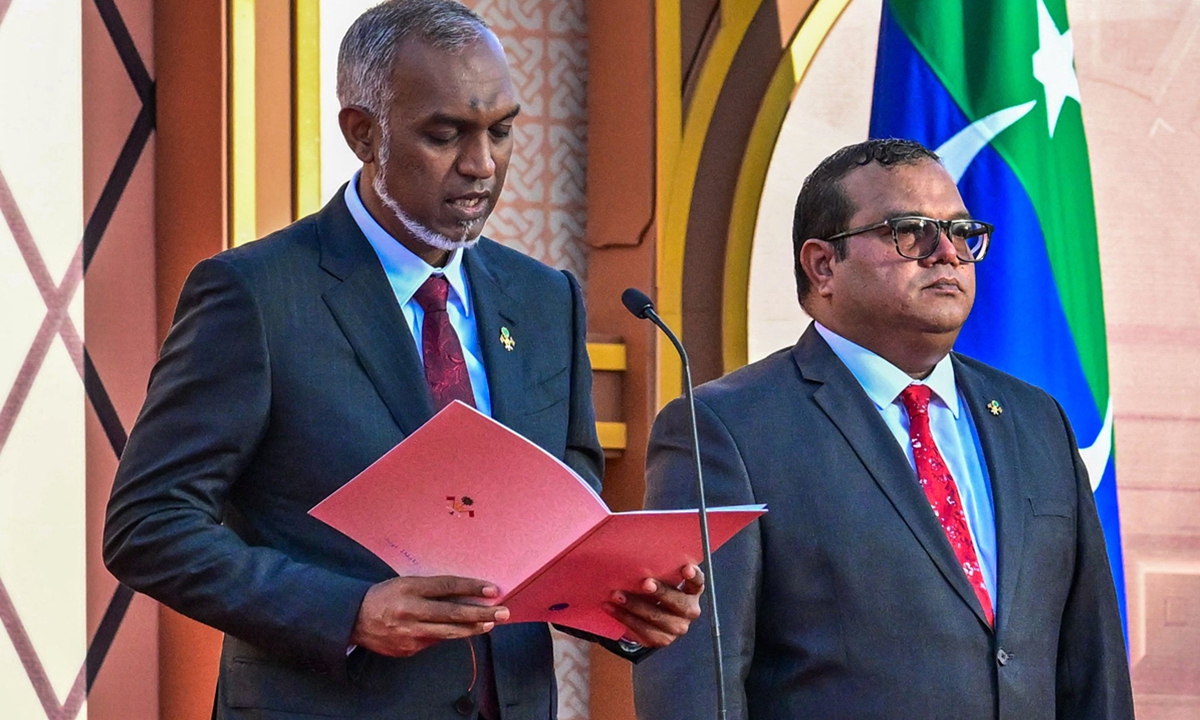
Mohamed Muizzu (left) reads out the oath during his inauguration ceremony in Male on November 17, 2023. President Mohamed Muizzu of the Maldives vowed on November 17 to expel Indian troops deployed in the strategically located archipelago, in his first speech to the nation after being sworn into power. Photo: VCG
Maldives President Mohamed Muizzu said at his inauguration on Friday that he will ensure there will be no foreign military presence on the country's soil. The newly elected president has made the request to Kiren Rijiju, India's minister for earth sciences, who was representing India at the president's inauguration.
This action is implemented under Muizzu's election promise. Before being elected, Muizzu made it clear that his top priority would be to remove the presence of the Indian military as soon as possible.
The Maldives' shift on foreign policy from "India First" to "India Out" has apparently made New Delhi unhappy. Rijiju representing India at the inauguration of the Maldives' new leader was itself a significant downgrade from the previous occasions where the Indian prime minister was present.
Before Muizzu's inauguration, Modi said that the Maldives holds a special place in India's "Neighborhood First" policy, and is a key player in enabling the vision of Security and Growth for All in the Region (SAGAR). But, the new Maldives president has approached the meaning of "security" differently from the current Modi administration. For Malé and the Maldivian people, the expelling of Indian military forces means keeping the country's independence and sovereignty.
It is said that the two governments would discuss workable solutions for continued cooperation. India has not made any commitment yet considering the matter. But New Delhi's next step will test its "Neighborhood First" policy - whether it's a policy aimed at peaceful and synergetic co-development with South Asian countries or it's an alibi of a big brother mind-set.
South Asian countries usually face this type of dilemma when dealing with their own development and security as well as India's attitude. The legitimate water demand of Bangladesh is an example. The Teesta River is an important river for both India and Bangladesh, and it is a vital source of water for irrigation, fisheries and drinking.
India presently controls 55 percent of the Teesta River water because every year the water supply to India decreases substantially between December and May,?while Bangladesh claims 50 percent of the water during that time. Hundreds of thousands of Bangladeshi people's livelihoods are impacted by the river. Due to India's excessive water withdrawal, almost 100,000 hectares of Bangladesh's rice bowl cannot be used for winter crops.
Moreover, India's improper management of the Teesta water resource made Bangladesh suffer from severe floods for decades. India reportedly opened all floodgates at the Gajaldoba barrage following heavy rains in the upstream region, which is the main cause of the scale and rapid intensity of Bangladesh's floods. Bangladesh had hoped for an equitable Teesta water-sharing agreement with India along the lines of the 1996 Ganges Water Treaty, but nothing came out of it.
Nepal also faces a similar situation. The Pokhara Airport, which is located in western Nepal's tourist hub, is now the country's second international airport after the one in the capital city of Kathmandu. It was a $244 million project and Nepal was expecting to boost international and regional connectivity via the airport.
But Nepal had to delay the inauguration of international flights until recently when the airport finally welcomed its first international flight in June 2023 after a prolonged wait of six months. Such a delay comes with complicated reasons, but the main reason is India's attitude. Nepal's Buddha Air wanted to commence its Varanasi (a city in northern India) flights from the Pokhara airport. However, the plan took a massive hit because it did not receive permission from India.
Was this an intentional ploy from India or just a technical hitch? The answer is anyone's guess. The Nepalese understood clearly that India looks at the Pokhara airport only from a technical point of view or from a strategic and tactical point of view.
India is also creating hurdles in free transit and free trade within and beyond Nepal. The water management between Nepal and India is another problem. The high structures being built on the Indian side to manage flooding expose Nepali villages to danger during the monsoon season.
The request of the Maldives this time reflects how much the "Neighborhood First" policy won, or hurt, other South Asian countries' hearts. South Asian countries are watching if India is squeezing their space for development or boost collaboration based on a win-win principle.
If India insists on a confrontational rather than a collective approach in the region, it will eventually undermine its political credibility and jeopardize its own political prospects across South Asia.
The author is a research fellow at the Center for BRICS Studies, Communication University of China. opinion@globaltimes.com.cn




